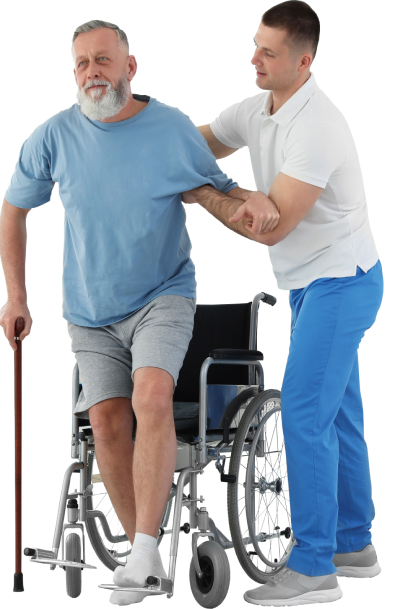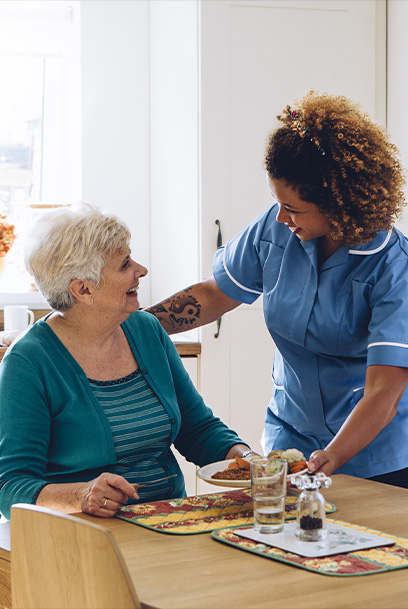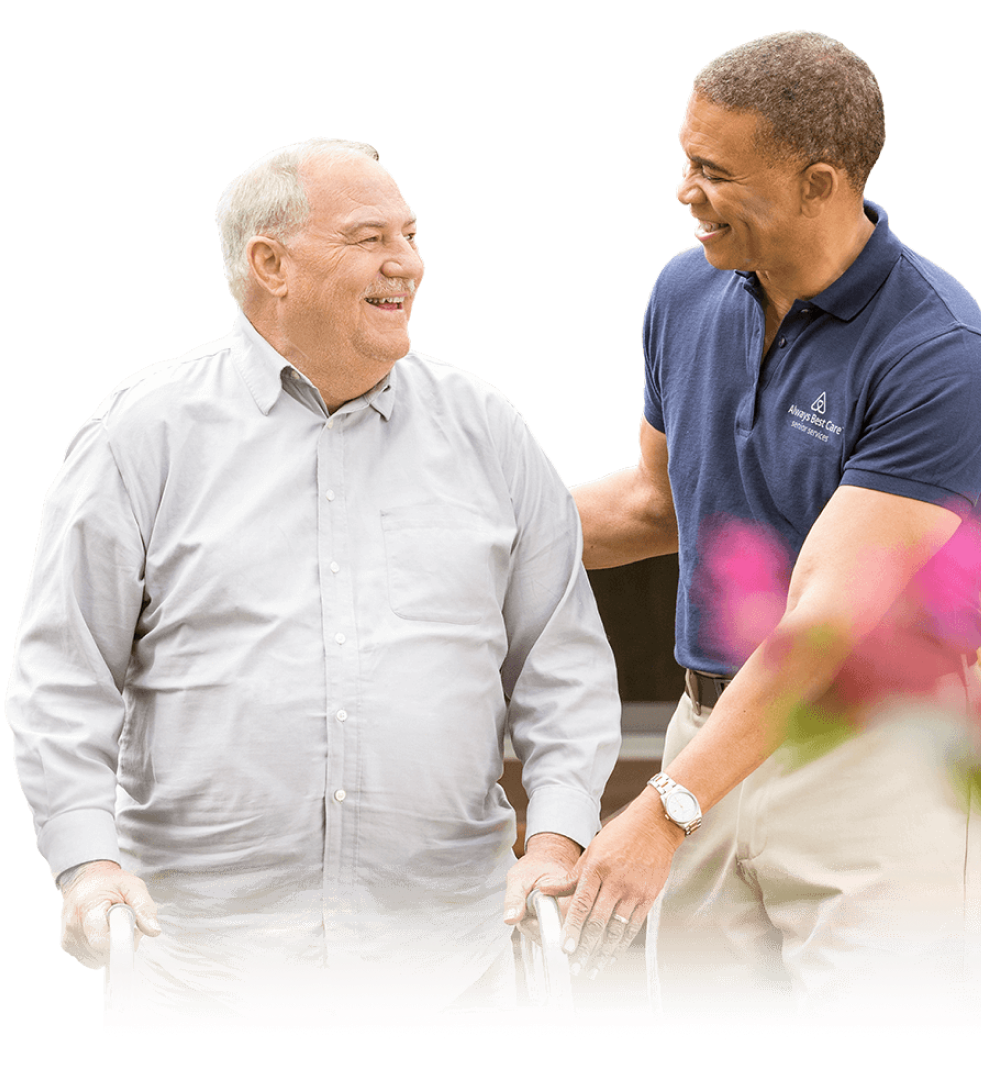This website uses cookies so that we can provide you with the best user experience possible. Cookie information is stored in your browser and performs functions such as recognising you when you return to our website and helping our team to understand which sections of the website you find most interesting and useful.
Home Care In Woodbridge, CA

They say that your golden years are the best years of your life. For most older Americans, that's how it should be - a time to relax, reflect, and live life in a familiar place. After all, senior citizens in the U.S. have worked tirelessly to build a better economy, serve their communities, and raise families.
However, as seniors grow older, sometimes they cannot live independently without someone by their side to provide care. Unfortunately, some older Americans aren't able to rely on their adult children for help. The reality in today's world is that family members do not have the skills or time to dedicate to caring for their parents. That's where Always Best Care Senior Services comes in.
Our in-home care services are for people who prefer to stay at home as they grow older but need ongoing care that family or friends cannot provide. More and more older adults prefer to live in the comforts or their home rather than in an assisted living community. Home care in Woodbridge, CA, is a safe, effective way to give your loved ones the care they need when they need it the most.

 Home Care Services
Home Care Services
 Service Areas
Service Areas
The Always Best Care Difference
Since 1996, Always Best Care has provided non-medical in-home care for seniors to help them maintain a healthy lifestyle as they age. We are proud to have helped tens of thousands of seniors to maintain a higher level of dignity and respect. We focus on providing seniors with the highest level of home care available so that they may live happily and independently.
Unlike some senior care companies, we genuinely want to be included in our clients' lives. We believe that personalized care is always the better option over a "one size fits all" approach. To make sure our senior clients receive the best care possible, we pair them with compassionate caregivers who understand their unique needs.
The Always Best Care difference lies in life's little moments - where compassionate care and trustworthy experience come together to help seniors live a fruitful, healthy life. Whether you are an aging adult that can't quite keep up with life's daily tasks or the child of a senior who needs regular in-home care services in Woodbridge, CA. Always Best Care is here to help.
“Love the information the office provide and how wonderful the office looked. Chelsea provide me”
“Highly Experienced #Caregivers provide everything in levels one and two, plus knowledgeable assistance to help”
“In retirement years, many #elders start to feel lonely and depressed with the lack of”
“Worrying about senior’s care and #health in Assisted Living is common. Well, you can stop”
“Love the information the office provide and how wonderful the office looked. Chelsea provide me with enough information.”
“Highly Experienced #Caregivers provide everything in levels one and two, plus knowledgeable assistance to help seniors who are suffering from a chronic illness, who are bed-bound, and those who are on hospice.”
“In retirement years, many #elders start to feel lonely and depressed with the lack of a social life. Hire #caregivers from Always Best Care of Fresno to reduce your senior’s loneliness and ensure their care.”
“Worrying about senior’s care and #health in Assisted Living is common. Well, you can stop fretting now. Contact Always Best Care of #Fresno and find the best Assisted Living communities near you.”
How does In-home Senior Care in Woodbridge, CA, work?

Home is where the heart is. While that saying can sound a tad cliche, it's especially true for many seniors living in America. When given a choice, older adults most often prefer to grow older at home. An AARP study found that three out of four adults over the age of 50 want to stay in their homes and communities as they age. When you begin to think about why, it makes sense. Home offers a sense of security, comfort, and familiarity.

The truth is, as we age we begin to rely on others for help. When a family is too busy or lives too far away to fulfill this role, in-home senior care is often the best solution. Home care services allow seniors to enjoy personal independence while also receiving trustworthy assistance from a trained caregiver.

At Always Best Care, we offer a comprehensive range of home care services to help seniors stay healthy while they get the help they need to remain independent. As your senior loved one ages, giving them the gift of senior care is one of the best ways to show your love, even if you live far away.

Types of In-Home Care In Woodbridge, CA
To give our senior clients the best care possible, we offer a full spectrum of in-home care services

Personal Care Services
If your senior loved one has specific care needs, our personal care services are a great choice to consider. Personal care includes the standard caregiving duties associated with companion care and includes help with tasks such as dressing and grooming. Personal care can also help individuals with chronic conditions like diabetes or Parkinson's or dementia.
Common personal care services include assistance with:
- Eating
- Mobility Issues
- Incontinence
- Bathing
- Dressing
- Grooming


Home Helper Services
Sometimes, seniors need helpful reminders to maintain a high quality of life at home. If you or your senior has trouble with everyday tasks like cooking, our home helper services will be very beneficial.
Common home helper care services include assistance with:
- Medication Reminders
- Meal Preparation
- Pet Care
- Prescription Refills
- Morning Wake-Up
- Walking
- Reading


Companionship Services
Using this kind of care is a fantastic way to make life easier for you or your senior loved one. At Always Best Care, our talented caregivers often fill the role of a companion for seniors. That way, older adults can enjoy their favorite activities and hobbies while also receiving the care they need daily or weekly.
Common companionship services include:
- Grocery Shopping
- Transportation to Appointments
- Nutritional Assistance
- Conversation
- Planning Outings
- Completing Errands
- Transportation to Community
- Events and Social Outings


Respite Care Services
According to AARP, more than 53 million adults living in the U.S. provide care to someone over 50 years old. Unfortunately, these caregivers experience stress, exhaustion, and even depression. Our respite care services help family caregivers address urgent obligations, spend time with their children, and enjoy other activities. Perhaps more importantly, respite care gives family members time to recharge and regroup. Taking personal time to de-stress helps reduce the risks of caregiver burnout.
When it comes to non-medical home care, our goal is to become a valuable part of your senior's daily routine. That way, we may help give them the highest quality of life possible. We know that staying at home is important for your loved one, and we are here to help make sure that is possible. If you have been on the fence about non-medical home care, there has never been a better time than now to give your senior the care, assistance, and companionship they deserve.

Advanced Healthcare Benefits of Home Care in Woodbridge, CA
Always Best Care in-home services are for older adults who prefer to stay at home but need ongoing care that friends and family cannot provide. In-home care is a safe, effective way for seniors to age gracefully in a familiar place and live independent, non-institutionalized lives. The benefits of non-medical home care are numerous. Here are just a few reasons to consider senior care services from Always Best Care.
Always Best Care offers a full array of care options for clients at all levels of health. With our trusted elderly care services, your loved one will receive the level of care necessary for them to enjoy the highest possible quality of life.
Request More Information
Aging in Place The Preferred Choice for Most Seniors
While it's true that some seniors have complicated medical needs that prevent them from staying at home, aging in place is often the best arrangement for seniors and their families. With a trusted caregiver, seniors have the opportunity to live with a sense of dignity and do so as they see fit.
In-home care makes it possible for millions of seniors to age in place every year. Rather than moving to a unfamiliar assisted living community, seniors have the chance to stay at home where they feel the happiest and most comfortable.
Here are just a few of the reasons why older men and women prefer to age at home:

Empowers Seniors Affordable Care Plans
In-home care is a valuable resource that empowers seniors to age in place on their own terms. However, a big concern for many families and their loved ones is how much in-home care costs. If you're worried that in-home care is too expensive, you may be pleasantly surprised to learn that it is one of the most affordable senior care arrangements available.
Typically, hiring an Always Best Care in-home caregiver for a few hours a week is more affordable than sending your loved one to a long-term care facility.
At Always Best Care, we will work closely with you and your family to develop a care plan that not only meets your care needs, but your budget requirements, too. Once we discover the level of care that you or your senior need, we develop an in-home care plan that you can afford.
In addition to our flexible care options, families should also consider the following resources to help offset potential home care costs:

Compassionate Care Trusted Caregivers
When you or your senior loved one needs assistance managing daily tasks at home, finding a qualified caregiver can be challenging. It takes a special kind of person to provide reliable care for your senior loved one. However, a caregiver's role involves more than meal preparation and medication reminders. Many seniors rely on their caregivers for companionship, too!
Our companion care services give seniors the chance to socialize in a safe environment and engage in activities at home. These important efforts boost morale and provide much-needed relief from repetitive daily routines. A one-on-one, engaging conversation can sharpen seniors' minds and give them something in which to be excited.
At Always Best Care, we only hire care providers that we would trust to care for our own loved ones. Our senior caregivers in Woodbridge, CA, understand how important it is to listen and communicate with their seniors. A seemingly small interaction, like a short hug goodbye, can make a major difference in a senior's day. Instead of battling against feelings of isolation, seniors begin to look forward to seeing their caregiver each week.
Our caregivers must undergo extensive training before they work for Always Best Care. In addition, our caregivers receive ongoing training throughout the year. This training ensures that their standard of care matches up to the high standards we've come to expect. During this training, they will brush up on their communication skills, safety awareness, and symptom spotting. That way, your loved one receives the highest level of non-medical home care from day one.
Taking the First Step With Always Best Care
The first step in getting quality in-home care starts with a personal consultation with an experienced care coordinator. This initial consultation is crucial for our team to learn more about you or your elderly loved one to discover the level of care required.
Our caregivers are trained to spot changes that clients exhibit, like mental and physical decline. As your trusted senior care company, we will constantly assess and update your care plan to meet any new emotional, intellectual, physical, and emotional needs.
If you have never considered in-home care before, we understand that you and your family may have concerns about your care plan and its care coordinator. To help give you peace of mind, know that every team member and caregiver must undergo comprehensive training before being assigned to a care plan.
An assessment of your senior loved one and the environment they currently live in

An in-depth discussion of the needs of your senior loved one

Reviewing a detailed care plan that will meet your senior loved one's needs

When you're ready, we encourage you to contact your local Always Best Care representative to set up a care consultation. Our Care Coordinators would be happy to meet with you in person to get to know you better, discuss your needs, and help put together a personalized care plan specific to your needs.
Latest News in Woodbridge, CA
Seeking COVID cure: Woodbridge woman helps in search for vaccine
Steve Mann/News-Sentinel columnisthttps://www.lodinews.com/news/article_cad905fe-a16f-11ea-987d-5bb884611c6a.html
Working behind the scenes of the scramble to bring a safe and effective vaccine for COVID-19 to market is Lodi native Judy Wudel.She is the executive director of business development for Worldwide Clinic Trials, a company based in North Carolina. It’s her job to contract with drug companies to provide the services required to take a new drug through phase 3 trials. Depending on how the testing goes, the drug would then be considered by the Food and Drug Administration (FDA) and approved (or not) for market.Her company pro...
Working behind the scenes of the scramble to bring a safe and effective vaccine for COVID-19 to market is Lodi native Judy Wudel.
She is the executive director of business development for Worldwide Clinic Trials, a company based in North Carolina. It’s her job to contract with drug companies to provide the services required to take a new drug through phase 3 trials. Depending on how the testing goes, the drug would then be considered by the Food and Drug Administration (FDA) and approved (or not) for market.
Her company provides services that include three phases of human trials, plus research, project and site management — all stepping stones to potential approval. The process can take years and buckets of money to gain approval.
For example, it could take up to 10 years and as much as $600 million dollars to complete the three trial phases. However, in the era of COVID-19 the FDA has tried to expedite the approval process, so “some of the normally strict guidelines for contracting have been ‘relaxed’ … while still maintaining the normal safety parameters for the drug,” says Wudel.
Interestingly, vaccines take a lot less time to test and considerably less money to take through trial, according to Wudel.
“The cost of bringing a vaccine trial to market is significantly less than the cost of other disease related trials due to (their) duration,” she said.
Many drugs
being studied
Wudel says worldwide there are currently about 677 drugs in development for COVID-19, some of which are new and some repurposed. About 70% of those are pre-clinical (not in human testing yet). Globally, there are about 1869 trials currently underway, she says. Her company has more than 10 of those trials currently underway, two of them involving Bay Area biotech firms. The names of the firms she works with are confidential.
During the human trials Wudel’s company records all data and lab results, which will be reviewed by the FDA when it considers approving the new medicine.
Her company also recruits the volunteers, who participate in the trials by allowing the experimental medicines to be administered to them, usually intravenously or orally, sometimes in a hospital setting. A volunteer may be paid a modest fee, ranging from $1,800 to $18,000, according to the company website. Before testing begins, volunteers are told about everything that could possibly go wrong. They also have 24/7 access to a doctor in case there is a problem.
New volunteers are first screened to make sure the study is a good fit for them, then they are given a physical assessment, and then the study begins once they are approved.
“When you participate in a clinical study, you help make medical advances possible, giving hope to countless people all over the world,” the company website says.
Wudel says that many times the volunteers are medical students, whose efforts help pay for their schooling. There are also “professional” volunteers who do it strictly for the money. Some, she says, are repeat volunteers, however, a person is only allowed to volunteer a maximum of five times.
Almost all of the research that is ultimately considered by the FDA and its European counterpart (EMA) is generated by a contract research organization such as Wudel’s employer, without which there would be almost no new medicines coming to market.
Wudel says she deals with the top 10 biotech companies on the West Coast; however, her company deals with most of the major pharma and biotech companies globally. She spends three or four days a week traveling from one end of California to the other seeing clients.
Traveling the world
Her travels have also taken her to such destinations as Rome, London, Athens and the Czech Republic. It is in these locations that Wudel attends “investigator” meetings, where all the trial investigators come together to discuss a project. A clinical investigator is someone who actually conducts the clinical investigation, and under whose immediate direction the drug is dispensed to a subject, according to the FDA.
With “shelter-in-place” orders in effect, Wudel says she has had to conduct business over the phone and through Zoom meetings. She says they’ve found that much of the work can be done remotely. However, she prefers personal, one-on-one contact.
Before she prepares a bid for services, Wudel says she studies the disease in question. What is it? What does it do? What are the symptoms? What are the impacts? She goes in fully read-up and prepared when meeting with the drug companies, knowing that through her efforts and those of her colleagues lives could be changed.
Wudel was born and raised in Lodi. She attended Lodi High School, but went on to graduate from Tokay High when Lodi High split. She went to the University of the Pacific and holds a bachelor of science degree in business administration. She lives in Woodbridge with her husband, Gary Allen.
She has been in the pharmaceutical and research industries for 30 years, seven of which have been with her current employer. She previously worked for drug giant Pfizer and PPD, a global contract research organization.
While her current focus has been diverted to arranging clinical trials for new COVID-19 drugs, she’s normally involved in clinical research for such diseases as Alzheimer’s, Parkinson’s, Multiple Sclerosis, and other neurological disorders, including rare diseases.
Searching for a cure
One area of research that’s close to her heart is for a condition known as Vanishing White Matter Disease (VWM), a genetic disorder that affects the nervous system and causes neurologic symptoms. It is found mainly in young children, Wudel says. Youngsters with the disease may suffer loss of motor skills, episodes of fever, loss of muscle coordination and balance, seizures and spasms, among other symptoms.
The motor difficulties in VWM are progressive, and some episodes result in permanent loss of neurological function and sometimes coma or death. Curing this disease is something Wudel is passionate about.
There is currently no treatment or cure for VWM, but Wudel sees hope in a new drug currently in clinical trials. “It gets exciting when you see the potential to cure or treat” a disease that has such a devastating impact on people, especially children.
She says the drug, if approved, probably won’t be a big money-maker for the company, emphasizing that sometimes it’s not about the money.
Some of her clients, she says, are small companies with “all their marbles in one basket.” That’s to say, the company has all their efforts and resources invested in one drug, and if it fails to gain approval, they’re finished.
Would Wudel ever be a volunteer in a drug trial? An emphatic ”No!”
“You never know what will happen in a drug trial,” she says.
———
Steve is a former newspaper publisher and lifelong Lodian whose column appears most Tuesdays in the News-Sentinel. Write to Steve at aboutlodi@ gmail.com.
OC boys basketball teams included in large field of inaugural California Live Tourney
ocsportszone.comhttps://ocsportszone.com/oc-boys-basketball-teams-included-in-large-field-of-inaugural-california-live-tourney/
A number of Orange County high school boys basketball teams are among the 163 squads that will compete in this weekend’s California Live tournament which is being run by the Southern California Interscholastic Basketball Coaches Association.Games will begin on Friday, June 16 and continue on Saturday June, 17 with the finals for all 10 divisions at Irvine High School Sunday, June 18 beginning at 9 a.m. according to Chris Nordstrom, tournament director and basketball coach at St. Margaret’s High School.Both Irvine gy...
A number of Orange County high school boys basketball teams are among the 163 squads that will compete in this weekend’s California Live tournament which is being run by the Southern California Interscholastic Basketball Coaches Association.
Games will begin on Friday, June 16 and continue on Saturday June, 17 with the finals for all 10 divisions at Irvine High School Sunday, June 18 beginning at 9 a.m. according to Chris Nordstrom, tournament director and basketball coach at St. Margaret’s High School.
Both Irvine gymnasiums will be utilized during the tournament.
The tournament is being held during the live period allowing scouts and college coaches to come out and look at some of the top prospects.
“Section 7 out in Arizona was one of the first ones to go and they’re still going,” Nordstrom said Wednesday. “That’s where any teams from SoCal had gone the last few years. This summer, after a lot of work with CIF and with the National High School Basketball Coaches Association, amongst others, they allowed us to do one in California.
“The boys are down here and the girls are in Northern California this same weekend. The whole big picture is the opportunity to provide a platform for high school teams to be in front of college basketball coaches instead of just that club format.”
High school sites including Irvine, Tustin, Crean Lutheran, Beckman, Woodbridge, San Juan Hills, Mission Viejo, Estancia and Laguna Hills will be used.
Teams are divided into divisions. Irvine, St. Margaret’s, Mission Viejo and Woodbridge will compete in the Destination Irvine Division.
Championships will be held for each division, Nordstrom said.
“That was a big deal for us, so we’re not just scheduling games,” Nordstrom said. “You are playing to win. Each bracket is a true bracket, you win your game and you move on.”
Teams who lose move into the consolation bracket.
Every team will play two games on Saturday, Nordstrom said.
Most regular CIF rules will be used, but there will be 16-minute halves, Nordstrom said.
Foothill Coach Yousof Etemadi will lead his team into Friday’s opener vs. Jesuit at 7:45 p.m. at Irvine’s court two.
“We are in the Chevy Silverado Bracket which is loaded with good teams from all over California,” he said.
Foothill has 11 returners from last year’s squad, “led by all-county player Isaiah Bernard, leading scorer Travis Paleo and a much improved 6-10 Danny Kennard,” Etemadi said.
Nordstrom said there has been great cooperation among all the host sites “in particular Irvine and Tustin (districts),” Nordstrom said.
“For year one, we’re hopeful and optimistic we can continue to grow and I think it’s going to be a lot of fun for the kids,” Nordstrom said. “There are going to be some great games. If you go through the top 100 teams in California, we’re probably missing one or two that aren’t going to be there. We pretty much have every best teams and every best player.”
FRIDAY OPENERS INCLUDE:
Crean Lutheran vs. Harvard Westlake, court one at Irvine at 5 p.m.
Santa Margarita vs. Taft, court one at Irvine, 7:30 p.m.
Foothill vs. Jesuit, court two at Irvine, 7:45 p.m.
JSerra vs. Carlsbad, Tustin High, 3:45 p.m.
Pacifica Christian vs. Edison (San Jose) at Mission Viejo court one, noon
Orange Lutheran vs. King Drew, Mission Viejo court one, 5 p.m.
Canyon vs. Palisades, Mission Viejo court one, 7:30 p.m.
Villa Park vs. Beverly Hills, Laguna Hills court two, 4 p.m.
Servite vs. Alemany, Estancia High, noon
Edison (OC) vs. Valley Christian, Tustin court two, 1:30 p.m.
San Juan Hills vs. Palm Springs, Friday, Woodbridge, 5 p.m.
Capo Valley Christian vs. LACES, Estancia court two, 5:15 p.m.
Woodbridge vs. Scripps Ranch, Beckman, 5:15 p.m.
St. Margaret’s vs. Irvine, Irvine court one, 8:45 p.m.
Mission Viejo vs. Steele Canyon, Mission Viejo, 2:30 p.m.
Admission is $10 and tickets can be purchased on the GoFan.com app. Some of the programs, including Irvine, will be charging $10 for parking, which will go toward the individual basketball programs, Nordstrom said.
For brackets of the 10 divisions, click here:
RELATED
Decathlon Dynasty: Irvine’s Woodbridge High wins sixth Orange County championship in seven years
Ian Haniganhttps://newsroom.ocde.us/decathlon-dynasty-irvines-woodbridge-high-wins-sixth-orange-county-championship-in-seven-years/
The academic decathlon victories keep coming for Irvine’s Woodbridge High School, which has just won its sixth county title in seven years.Woodbridge’s decathletes and their coach were announced as the 2023 Orange County Academic Decathlon champs on Friday night during an exuberant awards show at Orange Coast College, where hundreds of students were presented with individual and team medals.“Beyond the challenges of preparation and competition, this team realized that once you are a decathlete, you are forever...
The academic decathlon victories keep coming for Irvine’s Woodbridge High School, which has just won its sixth county title in seven years.
Woodbridge’s decathletes and their coach were announced as the 2023 Orange County Academic Decathlon champs on Friday night during an exuberant awards show at Orange Coast College, where hundreds of students were presented with individual and team medals.
“Beyond the challenges of preparation and competition, this team realized that once you are a decathlete, you are forever bound together with a very special group of teammates who become lifelong friends,” said Woodbridge Coach Mike Nakaue, whose teams have now won seven championships since 2006.
After outpacing squads from 34 other schools in the most recent two-day county contest, the Warriors are headed back to the California Academic Decathlon, where they placed third last year. And they’ll have some company from Orange County — but more on that in a minute.
“The 12 Woodbridge High decathletes realized quickly that the Academic Decathlon preparation is demanding and the challenges presented would stretch their efforts,” Nakaue said. “They do this not because it is easy but because it is hard. The competition is supposed to be hard and challenges all facets of learning. This year’s team accepted the challenges with highly favorable results. They took the position that they wanted to learn more and it was ‘never enough.'”
Staged at the county, state and national levels, academic decathlons are 10-event scholastic competitions that test students’ mettle with multiple-choice exams, speeches, interviews, essay assignments and the action-packed Super Quiz Relay, which is held in front of a live audience. Presented annually by OCDE and the Orange County Academic Decathlon Association, the Orange County Academic Decathlon took place over two consecutive Saturdays starting on Jan. 28.
“The Academic Decathlon is an opportunity for students to showcase their knowledge and skills across a wide range of academic subjects, from art and literature to economics and science,” said Orange County Department of Education Coordinator Kristin Rigby. “We are proud to see the high level of participation and competitiveness in this year’s decathlon, and we offer our congratulations to Woodbridge High School on their victory.”
OC’s top performers
After winning its first Orange County Academic Decathlon in 2006, Woodbridge rolled off four straight titles from 2017 to 2020 before taking the championship again in 2022. This year, in a contest that featured nearly 550 scholars from 35 schools, the Warriors scored 45,208.8 total points, enough to reclaim the top spot and earn yet another trip to the highly competitive California Academic Decathlon in March.
They’ll be joined there by six other Orange County schools: Valencia, University, Trabuco Hills, Westminster and Kennedy high schools and Fairmont Preparatory Academy were also invited to the state decathlon based on their overall team scores.
Here’s a breakdown of the highest-performing Orange County teams and their overall scores. (Schools advancing to the state competition are in bold.)
DIVISION 1
DIVISION 2
DIVISION 3
A decathlon of studies
Interestingly enough, the history of the academic decathlon can be traced back to former Orange County Superintendent Dr. Robert Peterson, who envisioned “a decathlon of studies” while he was a prisoner of war in Nazi Germany. The very first decathlon took place at Bolsa Grande High School in Garden Grove in 1968.
Today, academic decathlons feature nine-member teams competing for the highest scores on a series of multiple-choice exams, speeches, interviews and essay assignments. The rules dictate that each team must have three “Honor” students (those with GPAs of 3.80 and above), three “Scholastic” students (GPAs of 3.20 to 3.79) and three “Varsity” students (GPAs of 3.199 and below).
Contests culminate with the popular Super Quiz Relay, which returned this year to an in-person showdown in front of cheering fans after two years of COVID-19 precautions.
“It was truly exciting to see the students back in person, competing together again after two years of virtual events,” Rigby said. “The energy and excitement in the room was palpable, and it was inspiring to see students connecting as teammates, rallying around one another and rising to face challenges together.”
This year’s Academic Decathlon theme is “The American Revolution and the New Nation,” and Orange County’s sponsors are NuVision Federal Credit Union, Del Taco Restaurants Inc., Aeries Software, Townsend Public Affairs and Centigex.
The top scoring teams from across the state — Granada Hills and El Camino Real charter high schools have become perennial juggernauts — now get to prepare for the California Academic Decathlon, which is set to take place in Santa Clara from March 24 through March 26. The highest scoring squads from that contest will then head to the U.S. Academic Decathlon, which will be held in Frisco, Texas April 27 through April 29.
For now, Woodbridge remains focused on California’s decathlon, and Nakaue says his team is excited to return to an in-person format.
“They will do their best in representing Orange County, Woodbridge High, and all the other decathletes who were unable to attend in the past due to the pandemic,” he said.
Famed North Bay Winemaker Sues Napa County Over New Vineyard Project
Napa Valley, CA Patchhttps://patch.com/california/napavalley/famed-north-bay-winemaker-sues-napa-county-over-new-vineyard-project
At question for Jayson Woodbridge is 80 acres of hillside land on two parcels in Calistoga that "was utterly destroyed by the Glass Fire."NAPA COUNTY, CA — A famed North Bay winemaker is suing Napa County over what he claims is overreach regarding an "experimental" vineyard project on land burned in the 2020 Glass Fire.Jayson Woodbridge, who owns Hundred Acre Wine Group LLC, filed the suit Thursday in Napa County Superior Court in an effort to prevent the county from enforcing environmental regulatio...
At question for Jayson Woodbridge is 80 acres of hillside land on two parcels in Calistoga that "was utterly destroyed by the Glass Fire."
NAPA COUNTY, CA — A famed North Bay winemaker is suing Napa County over what he claims is overreach regarding an "experimental" vineyard project on land burned in the 2020 Glass Fire.
Jayson Woodbridge, who owns Hundred Acre Wine Group LLC, filed the suit Thursday in Napa County Superior Court in an effort to prevent the county from enforcing environmental regulations he says don't apply to the project.
At question is 80 acres of hillside land on two parcels along Pickett Road in Calistoga that "was utterly destroyed by the Glass Fire," according to the suit.
Prior to the fire, the property hosted various types of vegetation, including "manzanitas, bay trees, and scrub, and a small number of oak and digger pine trees," all of which were wiped out, the suit claims.
A year after the fire, Woodbridge removed the remains of the dead trees "from a small portion of the property nearest to the roadway and surviving structures," according to the suit.
Find out what's happening in Napa Valleywith free, real-time updates from Patch.
Because the removal didn't involve excavation and was "solely for the purpose of mitigating what had become a charred, unsafe and unsightly landscape," it doesn't meet the earth moving or disturbing definition in the county's conservation regulations nor does it constitute vegetation clearing or removal since all the trees were dead, the suit says.
The county believes those activities did, in fact, violate portions of its conservation code and that "virtually any activity undertaken on the property ... is subject to control under the Conservation Regulations and requires an Erosion Control Plan," according to the suit.
In May of this year, Woodbridge added an "experimental, non-erosive" dry-farmed vineyard to the land, which the county also believes violated conservation regulations and should be subject to an erosion control plan, the suit says.
Woodbridge again contends, however, that the regulations don't apply because he used techniques to install the vineyard that don't disturb the soil.
"The method involves placing a small, bottomless vessel on the ground, and filling that vessel with compost and a single rootstock," the suit says. "The rootstock then grows through the compost and roots into the soil without any tilling, drilling, or other soil disturbing activities."
The county wants Woodbridge to hire a scientist to create a vegetation map of the property, meet with county regulators to go over agricultural plans for the area, hire a qualified professional to develop an agricultural site plan and apply for an erosion control plan or prepare a restoration plan, according to the suit.
The county "is threatening to penalize plaintiff for clearing from its property the dead, charred remains of trees incinerated by the 2020 Glass Fire ... to prevent plaintiff from planting a unique, experimental, dry-farmed vineyard using novel, non-erosive techniques that do not disturb any of the soils on plaintiff's land, and instead force plaintiff to 'revegetate' the land with the same type of high-fire-risk trees that fueled the 2017 and 2020 wildfires," the suit claims.
The suit also claims that the county applies its conservation regulations unevenly throughout its jurisdiction, engages in "selective enforcement" and violated Woodbridge's right to due process by, in part, failing to provide any meaningful procedure for challenging the way the regulations have been applied to his vineyard.
In addition to court costs and attorney's fees, Woodbridge is asking the court to find that he didn't violate county codes and to stop the county from enforcing the conservation regulations with regards to his removal of the "fire-killed trees" and the introduction of the vineyard.
David Morrison, director of the county's Department of Planning, Building and Environmental Services, declined to comment on the lawsuit.
A case management conference has been set for March 15, 2023.
By Kiley Russell, Bay City News Foundation. Copyright © 2022 Bay City News, Inc. All rights reserved. Republication, rebroadcast or redistribution without the express written consent of Bay City News, Inc. is prohibited. Bay City News is a 24/7 news service covering the greater Bay Area.
Parts of Highway 99 reopen in San Joaquin County
Matthew Noberthttps://fox40.com/news/local-news/san-joaquin-county/san-joaquin-county-road-closures-continued-as-flooding-persists/
This is an archived article and the information in the article may be outdated. Please look at the time stamp on the story to see when it was last updated.(KTXL) — Caltrans District 10 announced on Wednesday morning that parts of Highway 99 have reopened after being closed since Monday.All southbound lanes have reopened along Highway 99 and a single northbound lane has reopened Woodbridge Road.In other parts of the county, more than two dozen roads were closed in sections due to continued flooding and other impacts...
This is an archived article and the information in the article may be outdated. Please look at the time stamp on the story to see when it was last updated.
(KTXL) — Caltrans District 10 announced on Wednesday morning that parts of Highway 99 have reopened after being closed since Monday.
All southbound lanes have reopened along Highway 99 and a single northbound lane has reopened Woodbridge Road.
In other parts of the county, more than two dozen roads were closed in sections due to continued flooding and other impacts caused by the most recent storms to hit Northern California.
The largest closure in the area is Lower Sacramento Road from Peltier Road to Woodson Road.
Flooding in this area caused the San Joaquin County Sheriff’s Office to issue a mandatory evacuation of the Arbor Mobile Home Park in Acampo.
Other closures include:
– Kennefick Road from Liberty Road to the north end of Kennefick Road
– Bruella Road from Liberty Road to the north end of Bruella Road
– Elliot Road from Liberty Road to Sacramento County Line
– Jahant Road from Dustin Road to Kennefick Road
– Jack Tone Road from Collier Road to Jahant Road
– 99 East Frontage Road from Harvest Road to Peltier Road
– Acampo Road from East Highway 99 Frontage Road to Kennefick Road
– Woodbridge Road from 99 Frontage Road to Hildebrand Road
– Clements Road from Highway 88 to Acampo Road
– Johnson Road from highway 12 to Acampo Road
– Kettleman Lane from Alpine Road to Locust Tree Road
– Lower Sacramento Road (North Bound) from Armstrong Road to Harney Lane
Flooding also affected much of southeastern San Joaquin County in the area around the city of Tracy.
One of the largest road closures is along Corral Hollow Road from I-580 to the Alameda County Line due to a mud slide.
Other closures in the area include:
– Patterson Pass Road from I-580 to the Alameda County Line
– Schulte Road from Lammers Road to 1000 feet west toward Tracy City Limits
– MacArthur Road from Linne Road to south end of MacArthur Road
– Chrisman Road from West Linne Road to Durham Ferry Road
– Durham Ferry Road from Chrisman Road to Bird Road
– Linne Road from Chrisman Road to Banta Road
– Durham Ferry Road from State Route 33 to Bevis Road
– Kasson Road from Linne Road to 1000 feet east of Mancuso Road
– Blewett Road from Bird Road to I-5 (overpass/California Aqeduct)
Disclaimer:


 209-613-4604
209-613-4604 




